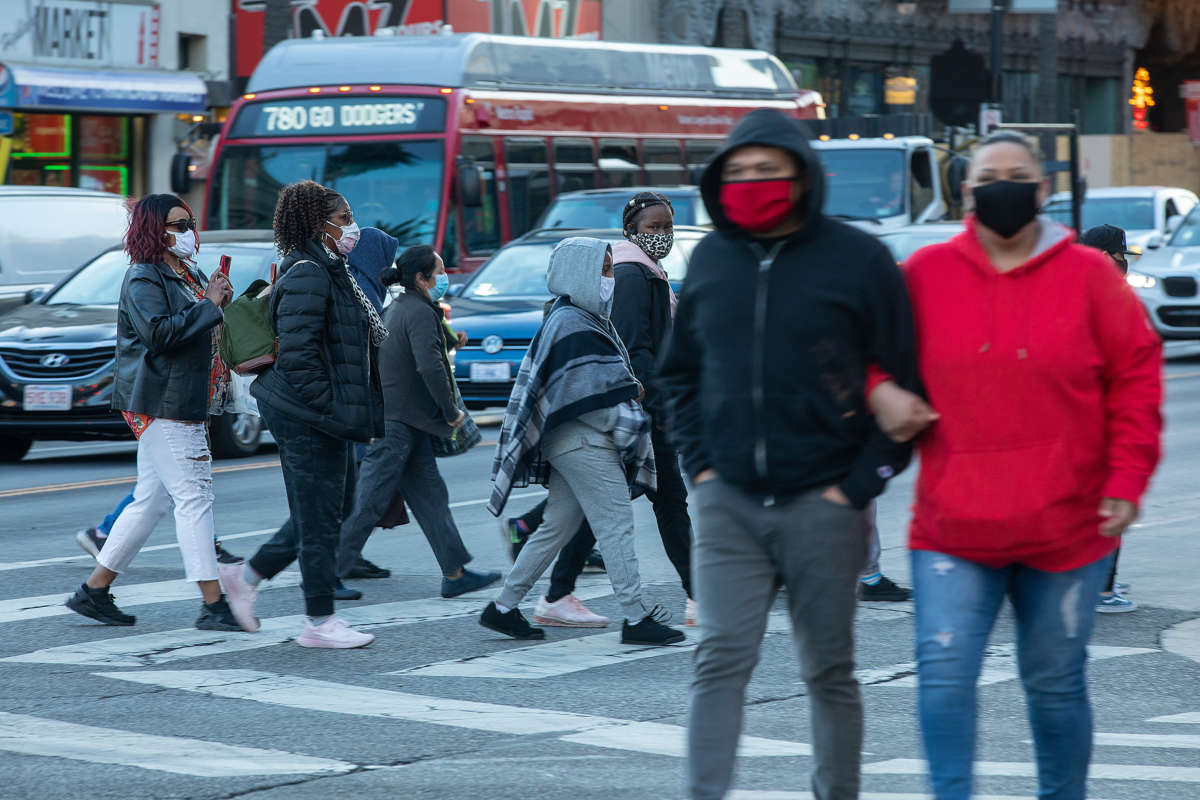Support justice-driven, accurate and transparent news — make a quick donation to Truthout today!
As President-elect Joe Biden gets ready to push for masks to be worn universally across the country in order to quell the spread of coronavirus, a new poll finds that most Americans back his mask mandate approach to managing the pandemic.
A Hill/HarrisX poll, conducted from November 10 to 13, shows that 75 percent of Americans would strongly support or somewhat support a national mask mandate. Just 25 percent say they would somewhat oppose or strongly oppose the idea.
Those results are actually down somewhat from a similar poll conducted in the summer, when 82 percent of Americans backed a mask mandate and just 18 percent were against the proposal. But the minute drop in support demonstrates that such a mandate would be widely accepted by most, and what’s more, might have lasting support to allow for it to be enforced long enough to be effective.
Both polls found that a majority of Americans of all political persuasions would back a mask mandate. Among Republican respondents in the more recent survey, 59 percent said they’d support a rule on wearing masks, with 41 percent saying they would be opposed. Ninety-three percent of Democrats back a mask mandate, and 72 percent of independents supported the idea as well, the poll found.
Currently, 34 states and D.C. have some form of mask mandates, although the rules on when and where one has to wear them are not uniform among all geographic locales.
Some health models, including the Institute for Health Metrics and Evaluation (IHME) at the University of Washington, predict that wearing masks could go a long way toward reducing the spread of coronavirus — including reducing the number of deaths related to COVID-19. By January 20 of next year, if things continue on their present track with no national mandate, the daily death count from COVID-19 could reach as high as 2,138. However, if masks are worn universally between now and then, that number would drop by 45 percent to just 1,168 deaths per day, IHME predicts.
Although he would be restricted by federal law from issuing a national mandate, Biden has said he plans to increase the rate of mask use among Americans by making personal appeals to local leaders, once he assumes office.
“First, I’ll go to every governor and urge them to mandate mask wearing in their states,” the president-elect recently said, “and, if they refuse, I’ll go to the mayors and county executives and get local mask requirements in place nationwide.”
But according to an analysis from Politico, at least 16 Republican governors who already don’t have a mandate in place will continue to refuse Biden’s request when he makes it, including South Dakota Gov. Kristi Noem.
Noem’s spokesman Ian Fury explained in an email to Politico that she has trusted residents “to exercise their personal responsibility to make the best decisions for themselves and their loved-ones.”
“She will not be changing that approach,” Fury added.
Noem’s home state is considered one of the worst in the nation, and indeed one of the worst places in the world, when it comes to dealing with coronavirus, not just because rates are so high in South Dakota, but also because residents there are buying into false claims from Republican leaders, including President Donald Trump, that the virus isn’t a big deal.
The direness of the situation was recently exemplified by a nurse from the state, Jodi Doering, whose tweets about the crisis went viral over the weekend.
“The ones that stick out are those who still don’t believe the virus is real,” Doering wrote in her social media posts. “The ones who scream at you for a magic medicine and that Joe Biden is going to ruin the USA. All while gasping for breath on 100% Vapotherm. They tell you there must be another reason they are sick. They call you names and ask why you have to wear all that ‘stuff’ because they don’t have COViD because it’s not real. Yes. This really happens.”
Media that fights fascism
Truthout is funded almost entirely by readers — that’s why we can speak truth to power and cut against the mainstream narrative. But independent journalists at Truthout face mounting political repression under Trump.
We rely on your support to survive McCarthyist censorship. Please make a tax-deductible one-time or monthly donation.
